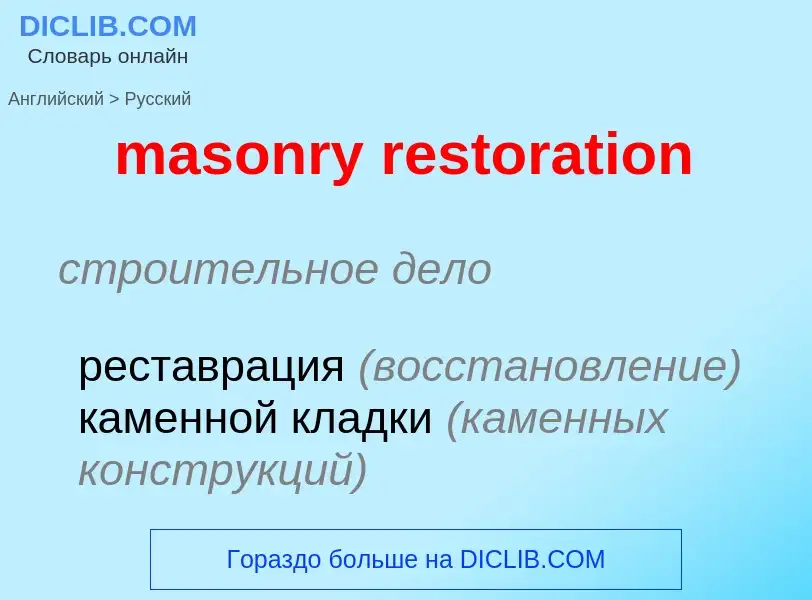Traducción y análisis de palabras por inteligencia artificial ChatGPT
En esta página puede obtener un análisis detallado de una palabra o frase, producido utilizando la mejor tecnología de inteligencia artificial hasta la fecha:
- cómo se usa la palabra
- frecuencia de uso
- se utiliza con más frecuencia en el habla oral o escrita
- opciones de traducción
- ejemplos de uso (varias frases con traducción)
- etimología
masonry restoration - traducción al ruso
строительное дело
реставрация (восстановление) каменной кладки (каменных конструкций)
Definición
Wikipedia

"Restoration comedy" is English comedy written and performed in the Restoration period of 1660–1710. Comedy of manners is used as a synonym for this. After public stage performances were banned for 18 years by the Puritan regime, reopening of the theatres in 1660 marked a renaissance of English drama. Sexually explicit language was encouraged by King Charles II (1660–1685) personally and by the rakish style of his court. Historian George Norman Clark argues:
The best-known fact about the Restoration drama is that it is immoral. The dramatists did not criticize the accepted morality about gambling, drink, love, and pleasure generally, or try, like the dramatists of our own time, to work out their own view of character and conduct. What they did was, according to their respective inclinations, to mock at all restraints. Some were gross, others delicately improper.... The dramatists did not merely say anything they liked: they also intended to glory in it and to shock those who did not like it.
The socially diverse audiences included aristocrats, their servants and hangers-on and a major middle-class segment. They were attracted to the comedies by up-to-the-minute topical writing, crowded and bustling plots, introduction of the first professional actresses, and the rise of the first celebrity actors. The period saw the first professional female playwright, Aphra Behn.


![The Rover]]'' by [[Aphra Behn]] is now a repertory favourite. The Rover]]'' by [[Aphra Behn]] is now a repertory favourite.](https://commons.wikimedia.org/wiki/Special:FilePath/Aphra Behn.jpg?width=200)
![[[Nell Gwynn]] was one of the first actresses and the mistress of Charles II. [[Nell Gwynn]] was one of the first actresses and the mistress of Charles II.](https://commons.wikimedia.org/wiki/Special:FilePath/Eleanor (Nell) Gwyn di Simon Verelst.jpg?width=200)
![John Lacy]] was the favourite comic of King Charles II. John Lacy]] was the favourite comic of King Charles II.](https://commons.wikimedia.org/wiki/Special:FilePath/John Lacy by John Michael Wright 1668-70.png?width=200)
